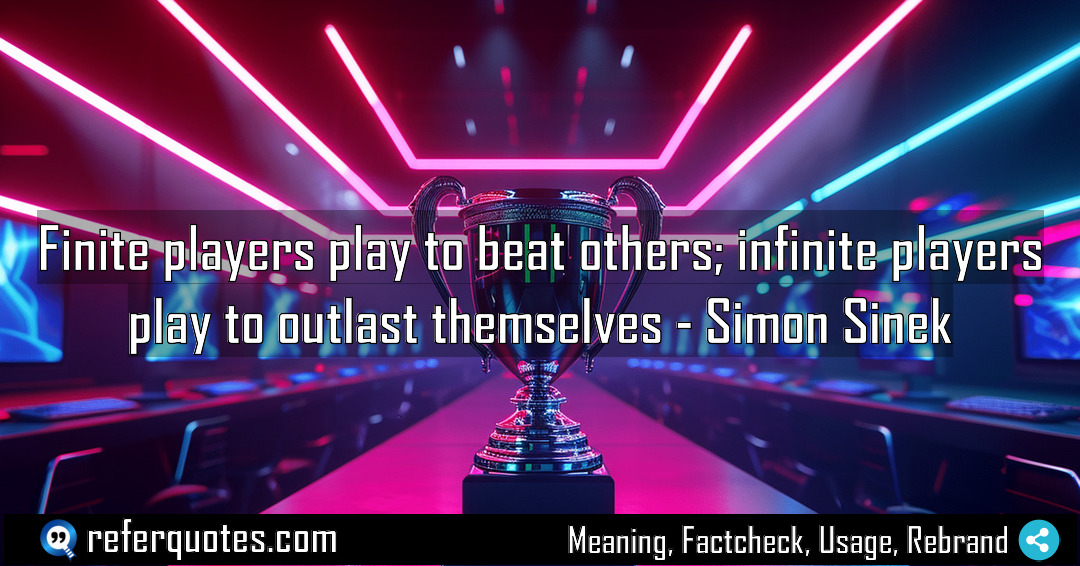You know, I’ve been thinking a lot about that Simon Sinek idea: “Finite players play to beat others…” It perfectly captures the difference between short-term hustlers and long-term legends. It’s not about winning the quarter, it’s about building something that outlives you.
Share Image Quote:Table of Contents
Meaning
It’s the fundamental distinction between a sprint and a marathon. Finite play is a contained game with known players and rules, aimed at winning. Infinite play is about continuing the play itself, where the goal is to keep the game going for future players.
Explanation
Look, I’ve seen this play out in so many companies. The “finite players” are the ones obsessed with their competitor’s every move. They’re all about “crushing Q4” and being #1 in a market category. And sure, that works for a while. But it’s exhausting. It’s a reactive, defensive way to operate.
The “infinite players,” the ones who truly change the game? They’re playing a different game entirely. They’re not focused on beating a rival; they’re focused on a Just Cause—a vision so compelling that it attracts the best talent and the most loyal customers. Their metric isn’t this quarter’s earnings; it’s whether the organization is stronger, more innovative, and more resilient than it was five years ago. They’re playing to outlast themselves, to build something that doesn’t just succeed under their leadership, but thrives long after they’re gone.
Quote Summary
| Context | Attributes |
|---|---|
| Original Language | English (3668) |
| Category | Personal Development (697) |
| Topics | competition (13), growth (413), self mastery (7) |
| Literary Style | minimalist (442), philosophical (434) |
| Emotion / Mood | humble (74) |
| Overall Quote Score | 84 (319) |
Origin & Factcheck
This concept comes straight from Simon Sinek’s 2019 book, The Infinite Game. He didn’t invent the core idea, though. He brilliantly adapted it from philosopher James P. Carse’s 1986 book, also titled Finite and Infinite Games. So while the phrasing is Sinek’s, the intellectual framework is Carse’s. A common misconception is that this is just about business; it’s really a lens for all of life.
Attribution Summary
| Context | Attributes |
|---|---|
| Author | Simon Sinek (207) |
| Source Type | Book (4032) |
| Source/Book Name | The Infinite Game (60) |
| Origin Timeperiod | 21st Century (1892) |
| Original Language | English (3668) |
| Authenticity | Verified (4032) |
Author Bio
Simon Sinek champions a leadership philosophy rooted in purpose, trust, and service. He started in advertising, then founded Sinek Partners and gained global attention with his TED Talk on the Golden Circle. He advises companies and the military, writes bestselling books, and hosts the podcast “A Bit of Optimism.” The Simon Sinek book list features Start With Why, Leaders Eat Last, Together Is Better, Find Your Why, and The Infinite Game. He speaks worldwide about building strong cultures, empowering people, and leading for the long term.
| Official Website | Facebook | X| Instagram | YouTube
Where is this quotation located?
| Quotation | Finite players play to beat others; infinite players play to outlast themselves |
| Book Details | Publication Year/Date: 2019; ISBN/Unique Identifier: 9780735213500; Last edition: Penguin Random House 2019; Number of pages: 272 |
| Where is it? | Chapter 1: Finite and Infinite Games, Approximate page from 2019 edition |
